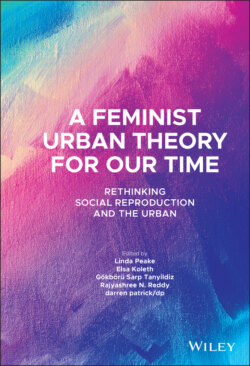Читать книгу A Feminist Urban Theory for Our Time - Группа авторов - Страница 22
Coda: Social Reproduction and the Urban During a Pandemic
ОглавлениеAs we submit this volume for publication, we have been living in what has been routinely referred to as the unprecedented time of the COVID-19 global pandemic. Each in our own distinct and interlinked ways, the authors of this chapter and editors of this book have confronted the individualizing paradoxes and isolating demands of the present moment from the vantage point of our own homes and eerily empty city streets here in Toronto. While it is important to be reflexive about how we ourselves have coped, as editors and authors of a book focused on feminist urban theory and social reproduction, we are also compelled to question the oft-mentioned phrase that we are living in unprecedented times. We ask: What exactly is unprecedented about this time? Is it unprecedented that inequality will increase? That millions will fall into poverty? That migration to cities will increase in the face of poverty? That once open cities will move to closure? That people are not able to safely access the healthcare they need because of enduring spatializations of racism? That those who suffer from ill health rooted in socio-environmental injustice will suffer in greater numbers from a novel virus? That people who are told to stay at home are not able to do so because they have no home or because their partner or parent is violent? That people will be made sick doing an underpaid and insecure job because their employer refuses to provide for basic health and safety considerations? Or that national governments and institutions alike are exploiting a crisis to institute militarized regimes of population control, to cut off access to information, to consolidate power? We could easily ask many more questions, those which address the issues that the pandemic does not so much create these calamitous conditions, but rather exposes them.
The deep systemic injustices, inequalities, and violences that have been accelerated by responses to this crisis are not new phenomenon, especially for the huge swathes of the world’s population living in states governed by conservative and neo-fascist leaders, but they are surfacing with a new intensity, shining light on capitalism as the history of the separation between capital and life. The spatial organization of our lives is marked by the pain and anxiety of this separation of life and capital. By the time you read these words, ‘the situation’ will have again shifted enormously; the constancy of change is now more apparent than ever, as is Dr. King’s call to attend to the fierce urgency of now. Thus, at the same time as the deeply stretched relations of social reproduction that form the warp and weft of urban everyday life are in the spotlight, we need to confront the violent re-instantiation of the ‘health’ of ‘the economy’ at the expense of everything and everyone else.
And yet the time of COVID-19 has also shown the city to be a site of ethical and political possibilities. The politics of care and connectivity that have surfaced in accounts of everyday life in cities across the globe reveal a bottom-up collective vision for helping those who lives are marginalized – refugees, immigrants, the homeless, the underpaid, targets of violence – in ways that are sustainable and speak to equality. Time will tell if there will also be a renewed politics of solidarity that arises out of these experiences. Rather than economizing, financializing, and dehumanizing society, we call for socializing and humanizing the economy, as the path by which we can reconsider, reclaim, and reconstruct our ways of being together to envision meaningful lives. This necessary re-orientation to life beyond capitalism will require reconsideration of social reproduction for years to come.
